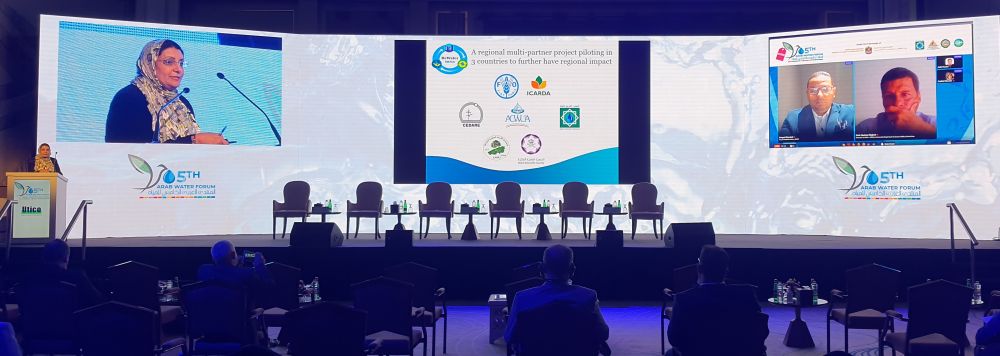Water Security in the Mediterranean Region

Sustainable Water Reuse Strategies in Agriculture – Case Studies and Regional Perspectives.
Water Reuse occupied a prominent place in the 2021 Arab Water Forum and was the topic of focus of two important sessions of this three days event. In the first day, the session ‘Water Security in the Mediterranean Region: Sustainable Water Reuse in Agriculture – Case Studies and Regional Perspectives’ brought together a group of leading experts and high-level public officials from the region to share their perspectives around a topic of growing interest in water management agendas. The session was convened by the International Water Management Institute (IWMI) ’s MENA office, the Desertification Research Centre (NRD) of the University of Sassari and the International Center for Advanced Mediterranean Studies (CIHEAM) of Bari and hosted panelists from the Jordan National Agricultural Research Center (NARC), the Tunisia Office National de l’Assainissement (ONAS), the Palestine Water Authority (PWA), the League of Arab States, the IWMI-MENA office and CENTA.
The first part of the session was dedicated to presenting two ongoing research projects, the SIDA funded ReWater MENA project implemented by IWMI and the EU funded MENA WARA project led by NRD and CIHEAM Bari. The presentations portrayed diverse water reuse contexts in specific countries of the Mediterranean region (Tunisia, Jordan, Palestine, Lebanon, Egypt, Spain and Italy) including their progress in terms of reused volumes, institutional developments, current and planned projects and policies. The described activities highlighted innovative technologies, economic models and participative approaches promoted and tested by these projects. Project Manager Dr. Nisreen Lahham of ReWater MENA, focused for example on the National Learning Alliance tool implemented by IWMI and its partners in Jordan, Lebanon and Egypt to organize long-term participative decision-making and knowledge sharing among multi-level and cross sectoral stakeholders. Professor Quirico Migueli, Director of the NRD stressed the importance of combining the use of non-conventional water with water efficient irrigation technologies and emphasized the importance of stakeholders’ engagement in the process.
In the second part of the sessions, a Q&A session was eloquently facilitated by Dr. Roula Khadra Senior researcher at CIHEAM Bari. The six panelists were invited to express their opinion or relate their experience around policies or actions that proved to contribute to water reuse development in their countries or the region or around challenges that prevent it. From the different contributions, several key messages emerged. First, it was reiterated (in the case of Jordan, Tunisia and Spain) that administrative collaboration and political consensus are key factors for establishing adequate institutional frameworks and arrangements. Second, formulating reuse standards and regulations should follow a ‘fit-for-purpose’ rationale and be tailored to the countries’ financial, administrative and technological capacities. Third, a paradigm shift from ‘expanding water reuse’ to planning reuse as part of a Water, Food and Energy Nexus is necessary in the region, where demand management is to come before supply. Finally, although it is still early to establish common reuse regulations in the region, the different Arab countries have different experiences in water reuse projects and policies and have much to learn from each other through dialogues and collaborations.
